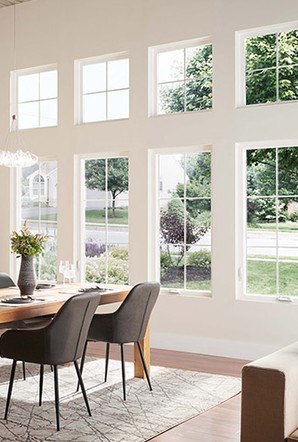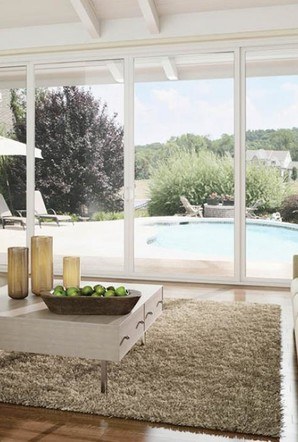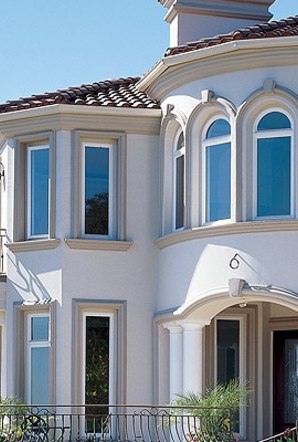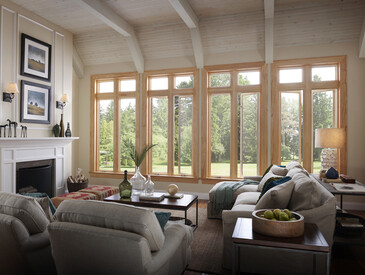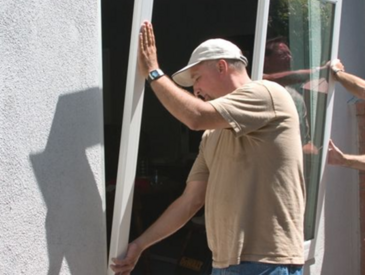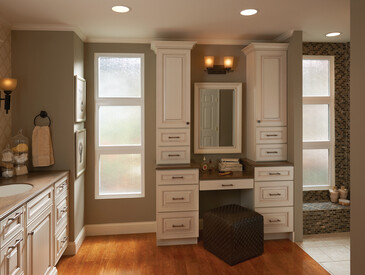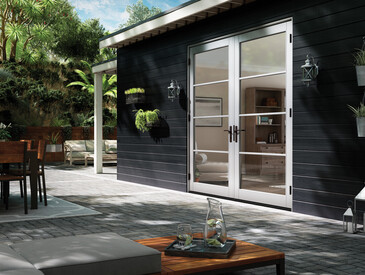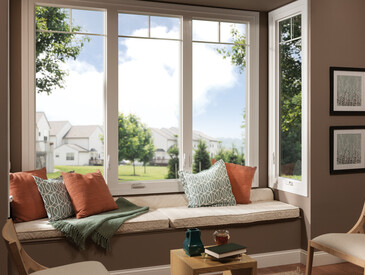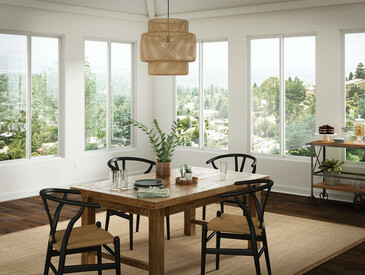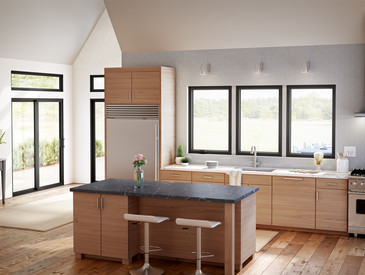You want to see the outside without hearing the outside. That’s the essence of a good window. But for many of us, that second part of the job is where too many windows fall short. Let’s face it: We live in a loud era. It seems that there are always cars driving past, planes flying overhead, and dogs barking their displeasure. And that makes it difficult to enjoy some peace and quiet in the comfort of your own home.
But while we can’t turn down the outside world’s volume, we can make adjustments to ensure that we don’t hear as much of it. And that starts with soundproof windows.
What Are Soundproof Windows?
Soundproof windows, also called acoustic windows, are a specialized type of window designed to significantly reduce the noise levels that enter a space. By incorporating multiple layers of glass and using advanced sealing technologies, these windows create a barrier against external sound. They’re ideal for homes in busy areas or for individuals seeking a quieter, more serene living environment.
Generally speaking, windows that are advertised as “soundproof” fall into one of two categories: noise reduction windows and noise canceling windows. The former can reduce the amount of outside noise that’s allowed into your space, while the latter will almost cancel the noise completely. However, buyers should know that there are no windows that are completely soundproof.

Benefits of Soundproof Windows
If you live in a busy area, there are many reasons you’d want to learn how to reduce noise from outside your windows, especially in areas like the bedroom or guest rooms. Soundproof windows can help you get a good night’s sleep, and they have other benefits, too.
Noise Reduction
One of the key benefits of soundproof windows is their ability to dramatically lower noise levels. Whether it's the hustle and bustle of city life, noisy neighbors, or the rumble of traffic, soundproof windows can help create a peaceful indoor environment. When searching for a soundproof window, there are two important acoustical rating systems to know:
- Sound Transmission Class (STC): The higher the STC number, the more efficient a window is at blocking outside noise. Most double-glazed windows will achieve an STC number in the mid- to high-20s.
- Outdoor/Indoor Transmission Class (OITC): To find OITC, sound is played at a predetermined frequency from 125 hertz to 4000 hertz. A receiver on the other side of the window picks up how much sound got through. The difference between the two numbers is the OITC. The higher the number the better, and most dual-pane windows have an OITC number in the low 20s.
As you’re pricing windows, remember to compare STC numbers to STC numbers and OITC numbers to OITC numbers. Too often consumers believe that a window from Company A with a 27 STC must have better sound reduction than a window from Company B with a 24 OITC. But these are different measuring systems, so it’s not an apples-to-apples comparison.
Strength and Durability
Soundproof windows are made from durable materials designed to withstand various elements while minimizing sound transmission. The glass used is often thicker and sometimes laminated, adding to its strength and sound-dampening capabilities.
Windows that are double- and triple-glazed – which typically have higher STC and OITC numbers – are usually stronger than other windows. Frames are typically made of robust materials like fiberglass or vinyl, ensuring the window's longevity and maintaining its soundproofing ability over time.
Energy Savings
Beyond their sound-reducing capabilities, soundproof windows can also improve energy efficiency. Having double- and triple-paned windows both helps to reduce noise and improve your home’s energy performance. These windows have warm-edge spacer systems, which hinder heat transfer, thereby keeping the interior of your home at a consistent temperature. At the same time, the spacer systems help reduce outside noise.
Disadvantages of Soundproof Windows
Soundproof windows have many benefits, but they’re not perfect. When you consider the following disadvantages, you may ultimately decide that soundproof windows aren’t right for your home.\
Cost
The advanced technology and materials used in soundproof windows mean they come with a higher price tag compared to standard windows. This initial investment can be a significant consideration for homeowners, especially when outfitting an entire house. The benefits of noise reduction and energy savings can offset this cost over time, but if your home is in a quiet area or you only live there part-time, you might decide that it’s not worth it to pay more.
Need for Professional Installation
To ensure their effectiveness, soundproof windows must be correctly installed. This process often requires the expertise of a professional installer. The precision needed in sealing the windows to prevent sound leaks can add to the overall cost and might not be suitable for DIY enthusiasts.
Lack of Ventilation
While soundproof windows excel at blocking noise, their tight seals can restrict airflow, potentially leading to inadequate ventilation, especially if you choose picture windows or another non-opening style. Homeowners might need to find alternative ways to circulate air in their homes, especially during warmer months, to maintain air quality and comfort.
How to Find the Best Soundproof Windows for Your Home
Not all soundproof windows are the same. The right choice of glass and frame material can help you find a window that fits your needs and budget.
Double- or Triple-Paned Glass
The choice between double- or triple-paned glass depends on your noise reduction needs and budget. Double-paned windows offer significant soundproofing and are cost-effective, while triple-paned windows provide maximum noise reduction and energy efficiency. Consider the level of ambient noise and your insulation requirements when making this choice.
Laminated Glass
Laminated glass is another excellent option for soundproof windows. This type of glass incorporates a layer of laminate between two sheets of glass, enhancing its sound-dampening properties. Laminated glass not only reduces noise but also adds an extra layer of security and UV protection, making it a versatile choice for homeowners.
Insulated Window Frames
Choosing the right frame material is important to maximize the benefits of soundproof windows. Frames made of fiberglass or vinyl offer the best insulation and durability because they reduce heat transfer and sound penetration, making your home more comfortable and quiet. Consider the aesthetic and thermal properties of each material to find the best fit for your home.
Explore Soundproof Windows from Milgard
Soundproof windows are a big investment, and you want to make sure you’re getting your money’s worth. Many manufacturers will sell “soundproof” windows, only for you to find out once they’re installed that they don’t work as advertised.
With Milgard, you always know what you’re getting from our windows. Our V400 Tuscany Series has excellent reviews for sound reduction, but all of our windows use high-quality materials and workmanship. Connect with a dealer to point you in the right direction - and get ready to sleep soundly at night.













